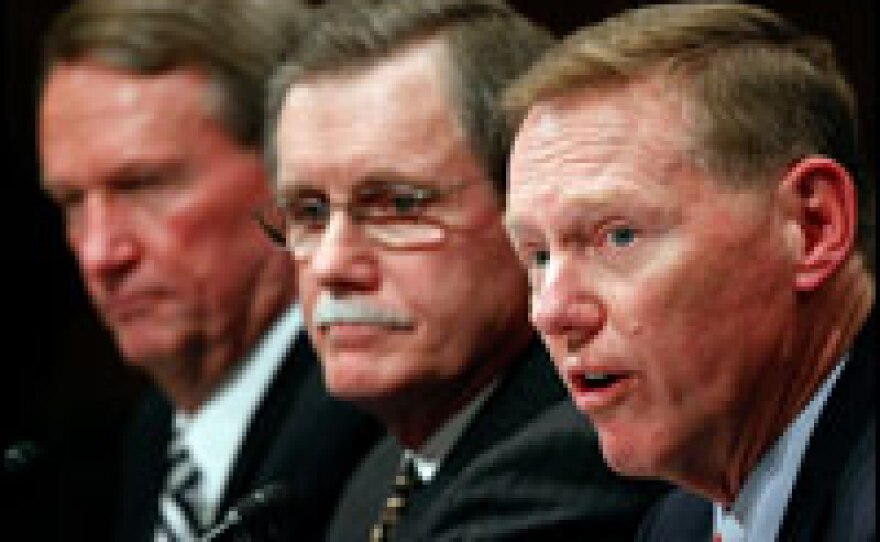
Executives of the Big Three U.S. automakers pleaded Thursday for a $34 billion government bailout, acknowledging that the industry had made mistakes but pledging to speed up cost-cutting measures that would get the companies back on track.
"We're here today because we made mistakes," General Motors chief executive Rick Wagoner told the Senate Banking Committee. Wagoner, who drove to the hearing in a test version of the electric Chevrolet Volt, apologized for asking for the loans.
"We're sorry to be asking for this support," he said. "We wish the market conditions were better, but they're not, so this is what we need to do."
Senate Banking Committee Chairman Christopher Dodd (D-CT) was sympathetic, acknowledging that the carmakers have already made some tough decisions.
"Some of the companies ought to be commended for going back to the drawing board, making tough decisions and stepping forward today," he said.
But Alabama Sen. Richard Shelby, the panel's top Republican, declared that he had opposed the bailout for financial firms and felt the same way about the auto industry.
"Applying the same standard, I intend to oppose bailing out the Big Three auto manufacturers," he said.
Sen. Charles Schumer (D-NY) questioned why lawmakers should trust the automakers with taxpayers' money.
"I don't trust the car companies' leadership," he said, but he acknowledged that the automakers cannot be allowed to fail.
The executives of GM, Ford Motor Co. and Chrysler LLC were joined at the Senate Banking hearing by the head of the United Auto Workers, Ron Gettelfinger, whose union announced Wednesday that it was prepared to make concessions to help the car makers trim costs.
In his testimony Thursday, Gettelfinger warned bluntly that in the absence of action by Congress: "I believe we could lose General Motors by the end of this month." He said the situation was dire and that time was of the essence.
Gettelfinger told the committee, "We are prepared to do our part." But he also said workers for the auto companies shouldn't have to make disproportionate sacrifices.
Big Three Struggling
The Big Three are struggling to stay afloat heading into 2009 during an economic recession, a steep decline in sales and a tight credit market. The three companies burned through nearly $18 billion in cash reserves last quarter.
The executives have presented corporate survival plans that would include massive restructuring. They told Congress that they will focus on higher fuel efficiency cars, if they receive the government loans.
GM. wants $4 billion and Chrysler asked for $7 billion before the end of the year. GM wants another $8 billion in early 2009 and a $6 billion line of credit in case it's needed. Ford has asked for a $9 billion line of credit.
Wagoner said his company's plan — which includes cutting costs and refocusing on high efficiency vehicles — would turn the company around.
"It's a blueprint for creating a new General Motors," Wagoner said in detailing the plan and request for aid.
Last month, the CEOs went to Congress seeking a $25 billion bailout, but they left empty-handed after lawmakers expressed skepticism over the industry's ability to restructure in a way that would put it on a long-term path to profitability.
Their case was further weakened when it was reported that GM's Wagoner, Ford's Alan Mulally and Chrysler's Bob Nardelli arrived in Washington aboard luxury corporate jets.
As part of their restructuring plans, the auto CEOs agreed to eliminate their fleets of corporate jets and forgo their salaries.
Concessions From The UAW
The UAW was also prepared to make concessions. In Detroit on Wednesday, following an emergency meeting of the union's leaders, the UAW announced that it would allow the Big Three to delay payments to a multibillion-dollar health care trust. The UAW also agreed to end a jobs bank program that pays laid-off workers most of their salaries and said it could begin talks that could lead to wage concessions.
But any wage concessions would require a vote by the union's rank-and-file membership. At Wednesday's meeting in Detroit, retired GM worker Frank Hammer handed out fliers urging no concessions.
"We're concerned that more concessions means more foreclosures," Hammer told NPR. "You all know how bad the foreclosures are here in the city of Detroit. We can't have more of this. Where are people going to go? What are people going to do?"
In the streets outside the Capitol, all three companies were trying to put their best foot forward, showing off futuristic, green car models. Wagoner's Chevrolet Volt is an extended-range electric vehicle expected to go on sale in 2010.
But even with a promise of change, the automakers likely face more hard questioning. Critics say the companies have been poorly managed and have so far failed to show how they will avoid the need for more loans in the future.
Senate Majority Leader Harry Reid (D-NV) and House Speaker Nancy Pelosi (D-CA) said the hearings would help determine whether Congress will have the special session next week to consider the bailout.
From NPR staff and wire reports
Copyright 2022 NPR. To see more, visit https://www.npr.org. 9(MDAzMjM2NDYzMDEyMzc1Njk5NjAxNzY3OQ001))






